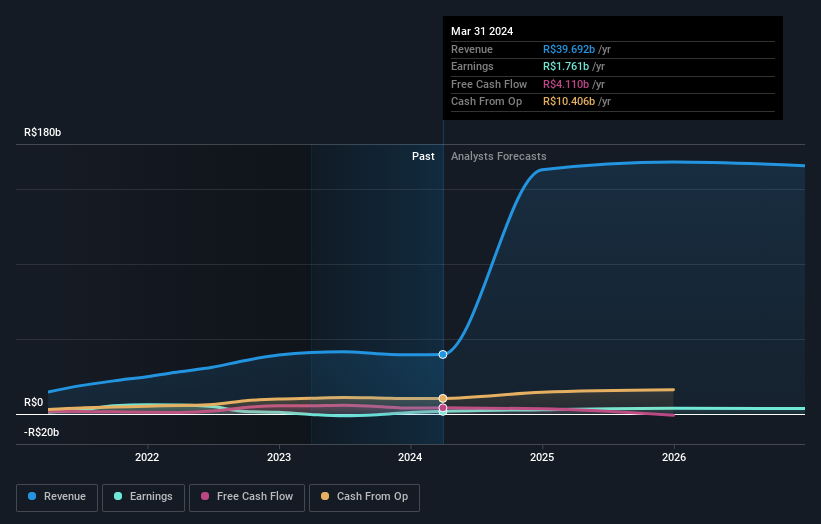- Brazil
- /
- Oil and Gas
- /
- BOVESPA:CSAN3
Retail investors among Cosan S.A.'s (BVMF:CSAN3) largest stockholders and were hit after last week's 4.3% price drop

Key Insights
- The considerable ownership by retail investors in Cosan indicates that they collectively have a greater say in management and business strategy
- A total of 6 investors have a majority stake in the company with 50% ownership
- Insiders own 30% of Cosan
To get a sense of who is truly in control of Cosan S.A. (BVMF:CSAN3), it is important to understand the ownership structure of the business. We can see that retail investors own the lion's share in the company with 37% ownership. In other words, the group stands to gain the most (or lose the most) from their investment into the company.
Following a 4.3% decrease in the stock price last week, retail investors suffered the most losses, but insiders who own 30% stock also took a hit.
Let's take a closer look to see what the different types of shareholders can tell us about Cosan.
Check out our latest analysis for Cosan

What Does The Institutional Ownership Tell Us About Cosan?
Institutional investors commonly compare their own returns to the returns of a commonly followed index. So they generally do consider buying larger companies that are included in the relevant benchmark index.
We can see that Cosan does have institutional investors; and they hold a good portion of the company's stock. This implies the analysts working for those institutions have looked at the stock and they like it. But just like anyone else, they could be wrong. When multiple institutions own a stock, there's always a risk that they are in a 'crowded trade'. When such a trade goes wrong, multiple parties may compete to sell stock fast. This risk is higher in a company without a history of growth. You can see Cosan's historic earnings and revenue below, but keep in mind there's always more to the story.

Cosan is not owned by hedge funds. Looking at our data, we can see that the largest shareholder is Rubens Ometto de Mello with 30% of shares outstanding. For context, the second largest shareholder holds about 5.9% of the shares outstanding, followed by an ownership of 5.5% by the third-largest shareholder.
We also observed that the top 6 shareholders account for more than half of the share register, with a few smaller shareholders to balance the interests of the larger ones to a certain extent.
Researching institutional ownership is a good way to gauge and filter a stock's expected performance. The same can be achieved by studying analyst sentiments. There are a reasonable number of analysts covering the stock, so it might be useful to find out their aggregate view on the future.
Insider Ownership Of Cosan
While the precise definition of an insider can be subjective, almost everyone considers board members to be insiders. Company management run the business, but the CEO will answer to the board, even if he or she is a member of it.
Most consider insider ownership a positive because it can indicate the board is well aligned with other shareholders. However, on some occasions too much power is concentrated within this group.
Our information suggests that insiders maintain a significant holding in Cosan S.A.. It is very interesting to see that insiders have a meaningful R$7.7b stake in this R$26b business. It is good to see this level of investment. You can check here to see if those insiders have been buying recently.
General Public Ownership
With a 37% ownership, the general public, mostly comprising of individual investors, have some degree of sway over Cosan. This size of ownership, while considerable, may not be enough to change company policy if the decision is not in sync with other large shareholders.
Private Company Ownership
Our data indicates that Private Companies hold 5.9%, of the company's shares. It's hard to draw any conclusions from this fact alone, so its worth looking into who owns those private companies. Sometimes insiders or other related parties have an interest in shares in a public company through a separate private company.
Next Steps:
While it is well worth considering the different groups that own a company, there are other factors that are even more important. For instance, we've identified 2 warning signs for Cosan (1 can't be ignored) that you should be aware of.
If you would prefer discover what analysts are predicting in terms of future growth, do not miss this free report on analyst forecasts.
NB: Figures in this article are calculated using data from the last twelve months, which refer to the 12-month period ending on the last date of the month the financial statement is dated. This may not be consistent with full year annual report figures.
New: AI Stock Screener & Alerts
Our new AI Stock Screener scans the market every day to uncover opportunities.
• Dividend Powerhouses (3%+ Yield)
• Undervalued Small Caps with Insider Buying
• High growth Tech and AI Companies
Or build your own from over 50 metrics.
Have feedback on this article? Concerned about the content? Get in touch with us directly. Alternatively, email editorial-team (at) simplywallst.com.
This article by Simply Wall St is general in nature. We provide commentary based on historical data and analyst forecasts only using an unbiased methodology and our articles are not intended to be financial advice. It does not constitute a recommendation to buy or sell any stock, and does not take account of your objectives, or your financial situation. We aim to bring you long-term focused analysis driven by fundamental data. Note that our analysis may not factor in the latest price-sensitive company announcements or qualitative material. Simply Wall St has no position in any stocks mentioned.
Have feedback on this article? Concerned about the content? Get in touch with us directly. Alternatively, email editorial-team@simplywallst.com
About BOVESPA:CSAN3
Undervalued with high growth potential.


